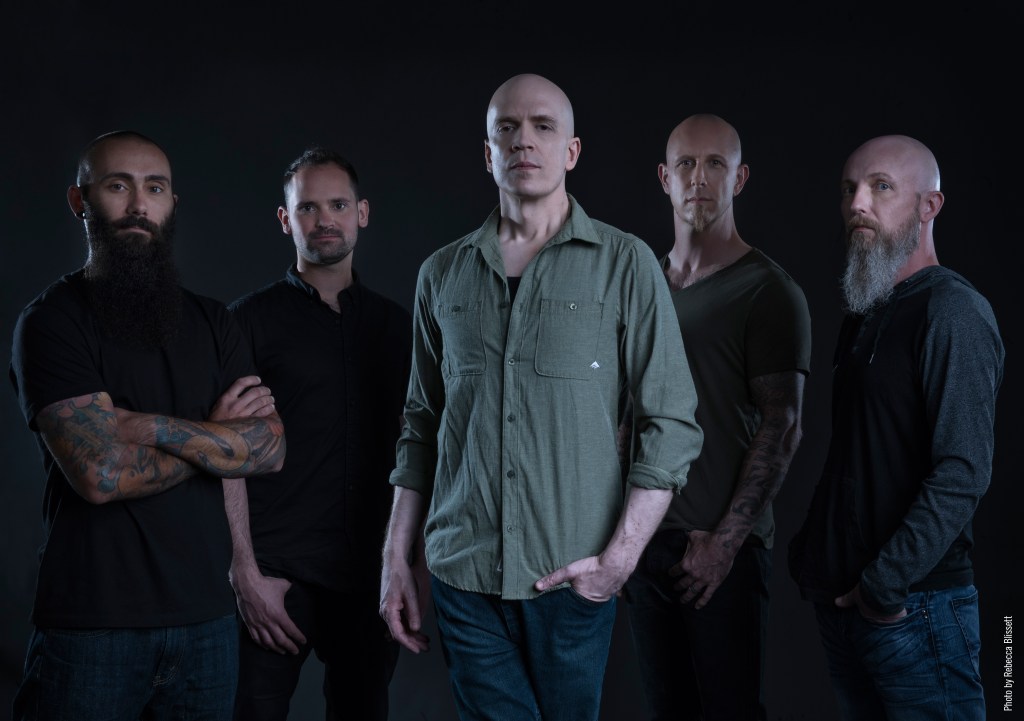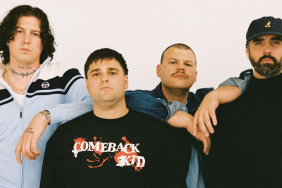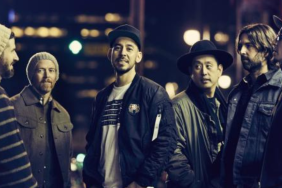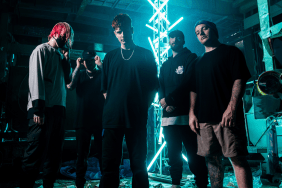Carving his own peculiar niche for himself in the world of metal, Devin Townsend is one of the genre’s most original and prolific artists. Cutting his teeth touring with Steve Vai in his late teens before starting the hugely influential Strapping Young Lad, the enigmatic auteur has done everything from concept albums about telepathic aliens to his country music inspired project Casualties of Cool. The Canadian polymath is even currently working on a symphony.
Renowned for his complex compositions, and wall of sound production style, the workaholic Townsend has always kept a tight rein over all his projects. Often making exact adjustments to and controlling every aspect of the writing and recording process, on Transcendence – the latest album from his solo venture Devin Townsend Project – he took a new approach.
Allowing his amazing band and production team into the process, the resultant album is some of the artist’s best work ever. Atmospheric at times and brutal at others, the album has been drawing rave reviews from critics the world over.
Currently on tour in North America in support of the album, we spoke to him about the record and how letting go of control helped him rejuvenate his own process.
Music Feeds: Transcendence saw you embrace a different recording process, tell me about that?
Devin Townsend: I think the whole reason my music is even in existence has a lot to do with a sort of constant analysis of it all, and trying to become a better person myself and a more productive human and not wanting to digress. And that has resulted in me making many different records in a lot of different styles over the past 25 years.
But ultimately they all have the same goal and that is what I just expressed, to become actualised, and as I get older the pool of inspiration starts to dry up. It’s not like it used to be where I could take the basic stuff of life as my creative catalyst, you know love or hate or whatever, you have to dig a little deeper. Or at least I felt I had to.
One of the ways I found inspiration for this record that has resulted in the process being significantly different was a book I worked on last year and being forced in a way to objectively look at my mental process and recognise there were certain traits that were ultimately causing problems. Stress. And often blocks to progress.
I started to recognise that my need to control every part of the process other than just the parts that were integral to my vision were probably things that need to be addressed. So I did on this record and I let other people in. Creatively. Technically. Opinion wise. A lot of things that upon completion, as hard as it was, resulted in a record that is almost more of a clear vision of what I wanted to say than anything I’ve done before. I don’t think you recognise how the deeper you get into a creative work how much you lose the ability to self-edit, and a different set of eyes, or ears, really can help.
MF: Do you feel like people repeating your ideas back to you can allow you to see them in a truer light?
DT: Definitely. In the same breath you can say, “wow, I didn’t realise how bad of an idea that was until someone else said it out loud”, you know. You can get so easily vaporised and disappear up your own ass if you’re not careful right? So I think this process has been an exercise in humility and compromise and, almost ironically, it’s resulted in the most accurate version of what I’ve been trying to do in a long time.
MF: Has it been a bit of a refresher for you then in a way? Do you feel rejuvenated by it?
DT: I don’t think I’m currently feeling rejuvenated by it, being in the process of touring it, but I think the record certainly has a rejuvenating quality to it. That’s based just on the fact that I had different people telling me “remember when you used to do this?” or “remember when you used to this?” and all of a sudden I’ve realised how much of an important part of my process that used to be, and by trying it out again and just trying it on for size, it’s like revisiting something from your past with a fresh sense of it. Ultimately I think that’s why I chose to revisit Truth from Infinity on the album.
MF: It must be difficult for you to demarcate your projects from each other, especially when some of them even overlap?
DT: Yeah it is, but at the same time I don’t multitask. Well I do multitask within the one project, and I know that’s a convoluted statement, but let’s just say I can’t pat my head and rub my tummy at the same time. I can pat in seven different ways at the same time though, and I think having all the different projects sort of play into that for me.
Ultimately my goals with music probably include making enough money to do whatever I want, whenever I want and take as much time as I need to do any of it. And as much as I feel sometimes that it’s too much work right now, or it’s been a lot of work over the past couple of years, signs are all pointing to the fact that if I stay that course that’s what I’ll be able to do. So that’s what I’m doing, just sticking to my guns and working hard to make sure all these projects get the proper attention that they deserve.
MF: Does that go back to the start of your career when, after working with Steve Vai, you started Strapping Young Lad? Was that a reaction against not having the freedom to do whatever you want whenever you want?
DT: Like anything in life, failures are success, and I think there are lessons to be learned from all of it. I think that from the Vai thing I’ve been finding ways to manipulate my business environment to do what I want. But slow and steady wins the race for me, I’m not running a sprint, I’m running a marathon.
MF: Is Transcendence another manifestation of that? Did letting go of control free you up again?
DT: Yeah I think so, but yet again this is only something that reveals itself to me now. I like to think that looking back in time it seems so clear but to be honest I never know what the hell is happening. I figure as long as I’m pointed in the right direction all I gotta do is keep walking.
MF: When you’re feeling lost or overwhelmed how do you orient yourself? How do you find the right direction?
DT: Nature and quiet. When things are quiet and when I’m around nature, and especially when it’s raining, I find myself really drawn to peaceful things, really peaceful things. And when I’m on tour, in the midst of these chaotic events like I am now, in the middle of middle America, I gravitate towards that. Like right now I’m in a hotel room, I can have some nice music playing, I can have a bath and that helps me. My true north is always going to be inward.
MF: Does that serve as a counter point to your music?
DT: I don’t think it’s a counterpoint, I think it’s actually one and the same. The music is almost like a kite that’s attached to that true north. So it’s flapping around in the wind, but it’s still connected to it. Its source is not moving, but what’s going on out there in the stratosphere is chaos.
MF: So peace and stillness is kind of your way of rationalising all the chaos that is happening around you?
DT: Very much, and I think that stillness, even when you fell like it has been shook, it’s always available. The stillness isn’t me, it’s something that is, and if you can find a way to be quiet enough you can hear it. I think people are all at different stages. Like me, I need it to be quiet to attain it but there are other people I’m sure who can attain it in the midst of anything, but I’m not there yet. I’m a heavy metal guitar player, I need it to be quiet.
MF: With the current climate over there in the United States now, is it harder to find that quiet with all the lunatic’s screaming, or can you shut it out?
DT: There’s no way you can shut it out, but I think you can fight it by writing things that are purposefully in opposition to it. A record like Transcendence for me is directly influenced by the chaos of it over here in North America. I feel like your only reaction against that is to fight it, but you don’t fight it with fire you fight it with something in opposition. So to write a record that has a state of mind like Transcendence, it isn’t coming from a place of naivety. It took a lot of work to be able to say something pleasant and powerful and when you’re surrounded by lunatics screaming all you want to do is yell “shut the fuck up”, right? But that doesn’t help. It don’t help it and it doesn’t help yourself to be shrieking in reaction to it. You need to purposefully find a place that’s quiet and that’s what Transcendence is.
MF: That sense of quiet you talk about goes against the stereotypical view of how people often see metal. Do you think your music shows that you can find lightness in heaviness?
DT: Sure, otherwise there is no heaviness at all. Even with Strapping, it was coming from the point of view of someone who didn’t want to give up. It wasn’t just hedonism. There was a fight there.
But be that as it may and something to be totally clear on, how you describe what I do, I’m not trying to be provocative with it. I’ve had people come up to me who are metal purists that say what I do isn’t metal based on the fact that it’s coming from the place that it’s coming from. And to be fair, I’ll accept that. You know, sure, that’s fine, I’ve got no problems saying that what I do isn’t metal. I don’t care. It’s like the old adage, call me whatever you want, just don’t call me late for dinner right? It doesn’t matter to me, I don’t have any emotional investment in being a purist of any sort. As long as I can do what I feel I need to do, I’m happy to be classified where ever is convenient.
MF: It seems to me like honesty, both to yourself and to your vision, is really all you care about at the end of the day.
DT: Yeah, but I can’t quiet figure out if that’s wisdom or despondency. But there is probably a fine line between the two.
–
‘Transcendence’ is out now. Grab a copy here.












